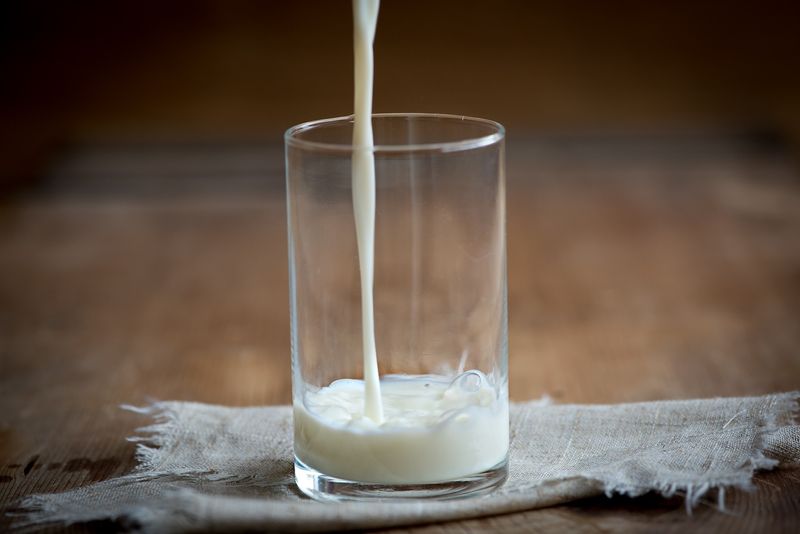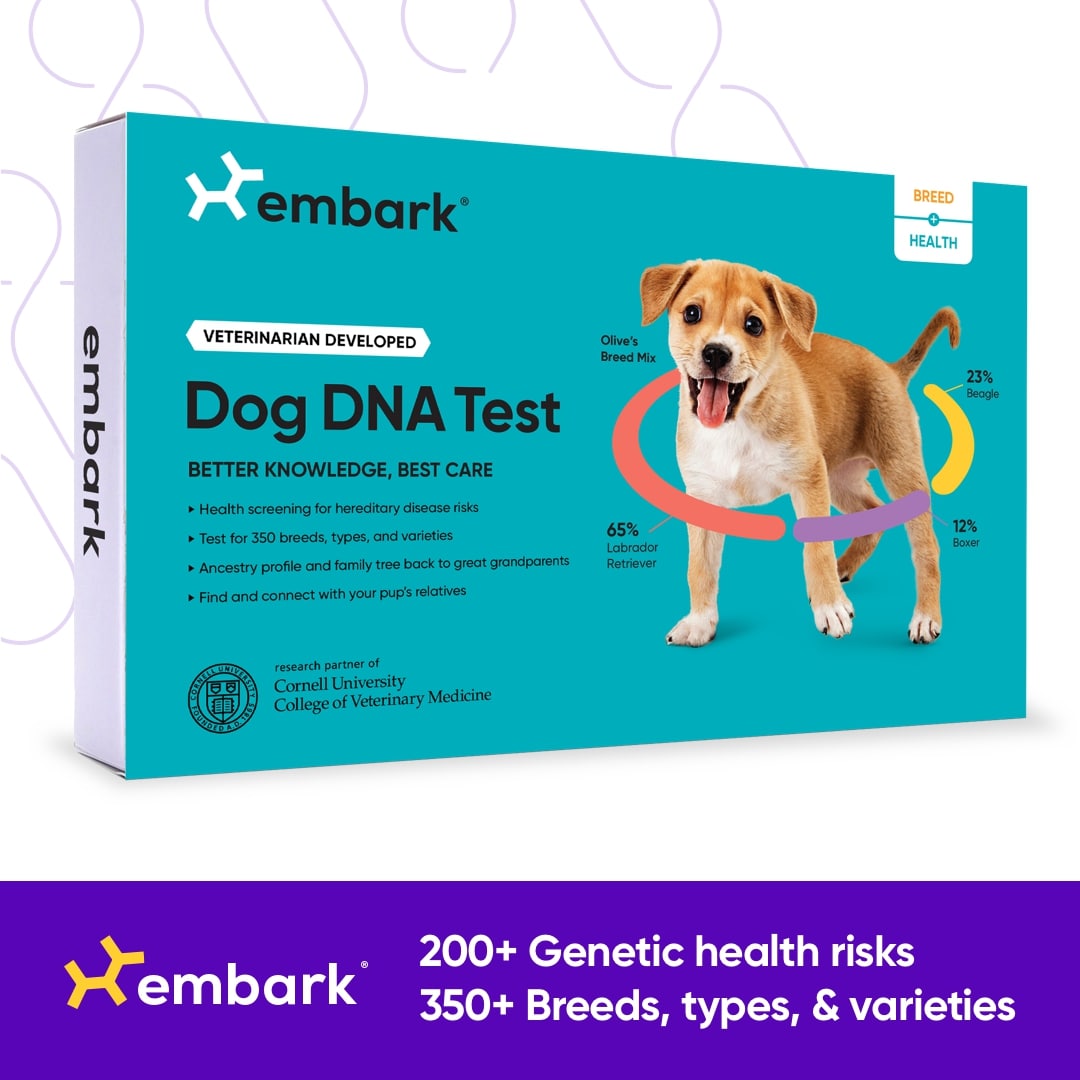Can puppies eat regular dog food? What’s the difference?
A lot of people wonder whether puppies can eat regular (adult) dog food. While they can, it isn’t recommended. Not if you want your dog to grow up nice, healthy and strong. Let us explain why.
Why can’t puppies eat adult dog food?
There are a lot of people that will give their puppies adult dog food to eat. It seems that many people just believe dog food to be dog food, and when a product is marketed as being ‘for puppies’ it is nothing more than a bit of crafty marketing.
Other people already own a dog when they bring a puppy into the family, and the two dogs just usually end up sharing food.
This is not recommended.
What you need to realize is that puppies have different nutritional requirements compared to a fully-grown dog. They are still growing, and at a rather rapid rate at that. This means that they need more nutrients that will help to aid their growth e.g. protein.
As a dog gets older, it has fewer protein requirements in its diet.
Basically, it all comes down to differences in nutrition.
Let’s dive deeper to look at the differences between puppy food and adult dog food. Hopefully, this will give you more of an idea as to why puppies should be eating specific puppy food.
Protein Content
We have already touched upon this in the previous section and this is the main reason why having puppies eat adult dog food is a big ‘no‘.
So, what is protein? Protein is often known as the building block of life. Every animal needs protein in its diet.
Proteins are a collection of nutrients that provide the animal with the resources they need to grow. Take your own body, for instance. Hair growth requires proteins. Nail growth requires protein. The formation of new skin cells requires protein.
You cannot develop properly without protein.
As you know, puppies grow at an astonishingly quick rate. They will be fully-grown adult dogs within 2-3 years. For this, they are going to need to have a lot of protein in their diet. Without it, their growth will be stunted. They may even suffer from medical issues that could lead to an early death.
This is where the ‘main’ difference with puppy food is.
In puppy food, the protein content will sit somewhere around the 23% mark.
In adult dog food, protein will be closer to the 18% mark. There may be a few small variations based upon the brand, but there will always be this huge difference between adult and puppy food.
This means that if you have puppies eat adult dog food, they will be getting 7% less protein. This is a huge amount for a growing animal.
It isn’t just the total protein count you need to pay attention to either. As we said; proteins are a collection of nutrients. There are many different proteins, and puppies will need different proteins compared to an adult dog.
Puppy dog food will be specially formulated to ensure that the puppies get the right proteins into their diet that allows them to thrive.
Calorie Differences
The number of calories in adult dog food will be lower than in puppy food.
Part of the reason for this is that puppies are a lot more energetic than adult dogs, but this isn’t the main reason as to why puppies need more calories.
We are going to keep things nice and simple here.
You can think of calories as energy. The more calories there are, the more energy the food will provide.
The growth of a puppy will take a phenomenal amount of energy, so they need this calorie count to be fairly high. Even if your dog is not running around all the time, it is still going to need those calories to support their growth.
As you may know, if you have a younger dog, it is recommended that you purchase for them a heating pad. This is because younger dogs lose body heat quite rapidly.
This loss of body heat puts a strain on the puppy. Their body will be constantly fighting to regulate body temperature, and this requires a lot of calories.
Without a sizeable number of calories pouring into their system, your dog could end up being rather cold.
Fat Content of Puppy Food
One of the reasons why puppy food is so calorie-dense is due to the higher fat content. Puppy food will contain about 3% more fat than adult dog food.
Obviously, fat is another component of healthy growth.
Every animal needs fat to grow. The higher fat content in puppy food assists this. It also ensures that there are far more calories packed into smaller meals.
After all, puppies have smaller stomachs. They are not going to be able to down as much food as their adult counterparts.
DHA Content of Puppy Food
DHA is an Omega-3 fatty acid. It is vital for the healthy growth of a brain.
If a puppy is being raised by their mother, then they will get the DHA that they need from their mother’s milk.
However, since most puppies will be separated from their mother before they have outgrown their need for DHA, it needs to be introduced to their diet in other ways.
Puppy food contains added DHA. Since adult dogs do not need DHA, it is not added to their food.
This means that if a puppy eats regular dog food, it will not be getting all the resources that they need for healthy brain development. This can cause mental health issues later on down the line.
Adult dog food will contain some Omega-3 sources, but this will be EPA. While it is still important for the growth of a dog, it is not going to have the same impact that DHA has on early brain development in puppies.
Calcium Content of Puppy Food

Puppy food has almost double the calcium as adult dog food.
The most important reason for getting the right amount of calcium into a puppy’s diet is to help support the development of its bones and teeth. After all, both are going to be growing at a rapid rate.
However, this is not the only reason why they need additional calcium. Calcium helps with muscle, joint, and cell development.
Once again, if your puppy is eating adult dog food, it is not getting everything that it needs to grow properly.
In fact, a low amount of calcium can result in brittle bones and teeth.
Phosphorous Content of Puppy Food
Puppy food will contain ever so slightly more phosphorus than adult dog food.
While phosphorus has a plethora of different benefits on the puppy’s system, the main benefit is to help with kidney development.
This helps to ensure that any toxins floating around your puppy’s body will be escorted out through the urine.
Adults do still need phosphorus, but their kidneys are no longer growing. They are just maintaining their size, so they need less of it.
Phosphorous also plays a major role in the development of motor skills. The puppy is still learning how to use their muscles. The phosphorus will help with these muscle contractions.
Phosphorus will play a major role in the energy systems of your dog as well. It can help to store excess energy, as well as aid the puppy’s body in making use of the energy that it has stored.
This is vital for a growing dog.
After all, they have a lot of calories coming in that need to be burned off. Without phosphorus, your dog simply will not grow as effectively.
You may even find that they get tired a lot more often.
Finally, phosphorus is also important due to the amount of extra calcium that your puppy is taking in. The phosphorus makes it a bit easier for the body to break down calcium during the digestion stage.
Size of the Kibble
Puppy kibble tends to be a bit smaller.
After all, it needs to go into smaller mouths. A lot of people will find that smaller dogs have a hard time swallowing adult-sized kibble.
The puppy kibble essentially reduces the risk of choking.
Taste of the Kibble
Some puppy food manufacturers claim that their foods are a little bit more palatable to puppies.
Since we can’t say we have ever eaten puppy food ourselves, we can’t say whether puppy food actually tastes better.
However, we suppose it makes sense. You need to guarantee that your puppy is eating, so you want food that is going to taste decent to them.
It will encourage them to eat more.
Cost
Puppy food is going to be a bit more expensive.
This is probably why many people choose to feed their puppies regular dog food as opposed to puppy food.
However, you do have to remember that the cost is justified. There is a lot more to your average puppy food than the adult counterparts.
Not just in terms of the effort put into the correct formulation, but the nutrients that need to be packed into it.
How to Transition a Puppy to Adult Dog Food?

When you transition your puppy to adult dog food will be dependent on several factors.
However, most dogs will be ready to make the switch somewhere between 1.5 and 2-years old.
Now, they will not be fully grown at this point, but that is fine. They will no longer have the nutritional requirements of a puppy.
A mistake many people make is to give their puppy a full bowl of adult dog food right away. This is just going to lead to issues. The process needs to be slow and gradual.
What you need to remember is that your puppy’s stomach and digestive system will be used to processing the puppy food. Adult dog food is completely different on a nutritional level.
The puppy’s body won’t know how to work with it. This can cause stomach pain and diarrhea.
The trick is to do things slowly. It may take several weeks for your puppy to make the switch.
- Start by making just 5-10% of the puppy’s food be adult dog food. The rest should be the food that they normally eat.
- Do this for a week, and monitor their stomach health. If there appears to be any stomach pain or diarrhea, then you may want to cut back the amount of adult dog food a little.
- If there no issues, then the next week you can add a little bit more adult food into the mix. Increasing it from 5-10% to around 25-50% is justified if your puppy shows little to no signs of distress.
- Repeat the process. After 2-months, the puppy should have completely transitioned to adult food.
Can Adult Dogs Eat Puppy Food?
We have talked a lot about whether you can have puppies eat adult dog food but let’s wrap this discussion up by talking about the opposite.
Can adult dogs eat puppy food?
Generally speaking, the short answer is no.
There will not be as many issues with adult dogs eating puppy food. The main concern comes from having it the other way around.
However, you still need to remember that puppy food has a higher calorie count. This can lead to overwhelming increases in weight gain in older dogs.
They will struggle to burn off these many calories, even if they are very active.
The one exception to this rule is if your dog is lactating i.e., they have just given birth to a litter of puppies.
The increased nutrients in puppy food will be fantastic for a dog that is feeding her off-spring milk. Although, you will want to start to wean the adult dog from the puppy food once her litter of puppies have moved onto solids.
Conclusion
As you can see; if you have a puppy, then you need to give it food that has been formulated for puppies.
If you choose to feed your puppy regular dog food then you will be hindering their development.
It is important to ensure that you choose the right puppy food for your furry friend too.
This guarantees that your dog is getting everything that they need into their system. This allows them to thrive with the minimal risk of health issues.
I hope that this article has been helpful, informative, and has given you the answers you were looking for regarding your puppy eating adult dog food or vice-versa.







![How to Get A Dog to Drink Water After Surgery [Helpful DIY Guide]](https://smarterpuptraining.com/wp-content/uploads/2020/10/how-to-get-your-dog-to-drink-water-after-a-surgery-1-768x512.jpg)

